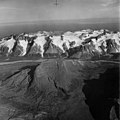| Icy Peak | |
|---|---|
 Northwest aspect, in 1960 | |
| Highest point | |
| Elevation | 4,550 ft (1,390 m) [1] |
| Prominence | 1,300 ft (396 m) [1] |
| Parent peak | Mount Kialagvik [1] |
| Isolation | 8.52 mi (13.71 km) [1] |
| Coordinates | 57°15′01″N156°32′09″W / 57.2502573°N 156.5357253°W [2] |
| Geography | |
 | |
| Interactive map of Icy Peak | |
| Country | United States |
| State | Alaska |
| Borough | Kodiak Island Borough [2] |
| Protected area | Alaska Peninsula National Wildlife Refuge |
| Parent range | Aleutian Range [2] |
| Topo map | USGS Ugashik B-2 |
Icy Peak is a 4,550-foot-elevation (1,390-meter) mountain summit in Alaska, United States.



